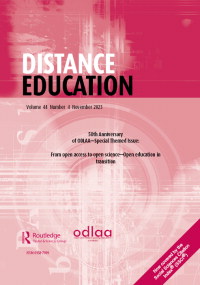利用在线照片语音和基于社区的参与性研究,了解COVID-19期间在线远程教育的促进因素和障碍
IF 3.7
1区 教育学
Q1 EDUCATION & EDUCATIONAL RESEARCH
引用次数: 4
摘要
在本研究中,我们使用在线照片语音和基于社区的参与性研究来了解和解决土耳其大学生在线远程教育的促进因素和障碍。在同意这项研究的260名学生中,240人分享了最重要的促进因素,190人分享了最重要的障碍,190人完成了与他们的教育相关的背景问题。我们使用在线解释性现象学分析来确定关键的促进因素和障碍。出现了十个主要的促进主题,包括使用互联网和技术的优势(n = 104;43%);愉悦的感觉(n = 61;25%);节省时间(n = 37;15%);社会支持(n = 28;12%)。出现了九个主要障碍主题,包括在线教育的挑战(n = 51;31%);精神病理学和不愉快的感觉、思想和身体感觉(n = 37;19%);网络问题(n = 34;18%);COVID-19限制(n = 30);16%)。本文章由计算机程序翻译,如有差异,请以英文原文为准。
Using online photovoice and community-based participatory research to understand facilitators and barriers to online distance education during COVID-19
Abstract In this study, we used online photovoice and community-based participatory research to understand and address facilitators and barriers to online distance education for college students in Turkey. Out of 260 students who consented to the study, 240 shared the most important facilitator, 190 shared the most important barriers, and 190 completed our contextual questions related to their education. We used online interpretative phenomenological analysis to identify key facilitators and barriers. Ten main facilitator themes emerged, including advantages of using Internet and technology (n = 104; 43%); enjoyable feelings (n = 61; 25%); saving time (n = 37; 15%); and social support (n = 28; 12%). Nine main barrier themes emerged, including challenges of online education (n = 51; 31%); psychopathology and unenjoyable feelings, thoughts, and bodily sensations (n = 37; 19%); Internet problems (n = 34; 18%); and COVID-19 restrictions (n = 30; 16%).
求助全文
通过发布文献求助,成功后即可免费获取论文全文。
去求助
来源期刊

Distance Education
EDUCATION & EDUCATIONAL RESEARCH-
CiteScore
10.70
自引率
6.80%
发文量
29
期刊介绍:
Distance Education, a peer-reviewed journal affiliated with the Open and Distance Learning Association of Australia, Inc., is dedicated to publishing research and scholarly content in the realm of open, distance, and flexible education. Focusing on the freedom of learners from constraints in time, pace, and place of study, the journal has been a pioneering source in these educational domains. It continues to contribute original and scholarly work, playing a crucial role in advancing knowledge and practice in open and distance learning.
 求助内容:
求助内容: 应助结果提醒方式:
应助结果提醒方式:


